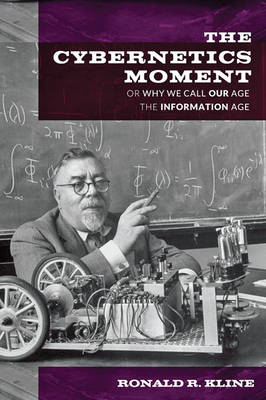
The Cybernetics Moment
Or Why We Call Our Age the Information Age
Seiten
2015
Johns Hopkins University Press (Verlag)
978-1-4214-1671-7 (ISBN)
Johns Hopkins University Press (Verlag)
978-1-4214-1671-7 (ISBN)
Outstanding Academic Title, Choice Cybernetics-the science of communication and control as it applies to machines and to humans-originates from efforts during World War II to build automatic antiaircraft systems. Following the war, this science extended beyond military needs to examine all systems that rely on information and feedback, from the level of the cell to that of society. In The Cybernetics Moment, Ronald R. Kline, a senior historian of technology, examines the intellectual and cultural history of cybernetics and information theory, whose language of "information," "feedback," and "control" transformed the idiom of the sciences, hastened the development of information technologies, and laid the conceptual foundation for what we now call the Information Age.
Kline argues that, for about twenty years after 1950, the growth of cybernetics and information theory and ever-more-powerful computers produced a utopian information narrative-an enthusiasm for information science that influenced natural scientists, social scientists, engineers, humanists, policymakers, public intellectuals, and journalists, all of whom struggled to come to grips with new relationships between humans and intelligent machines. Kline traces the relationship between the invention of computers and communication systems and the rise, decline, and transformation of cybernetics by analyzing the lives and work of such notables as Norbert Wiener, Claude Shannon, Warren McCulloch, Margaret Mead, Gregory Bateson, and Herbert Simon. Ultimately, he reveals the crucial role played by the cybernetics moment-when cybernetics and information theory were seen as universal sciences-in setting the stage for our current preoccupation with information technologies.
Kline argues that, for about twenty years after 1950, the growth of cybernetics and information theory and ever-more-powerful computers produced a utopian information narrative-an enthusiasm for information science that influenced natural scientists, social scientists, engineers, humanists, policymakers, public intellectuals, and journalists, all of whom struggled to come to grips with new relationships between humans and intelligent machines. Kline traces the relationship between the invention of computers and communication systems and the rise, decline, and transformation of cybernetics by analyzing the lives and work of such notables as Norbert Wiener, Claude Shannon, Warren McCulloch, Margaret Mead, Gregory Bateson, and Herbert Simon. Ultimately, he reveals the crucial role played by the cybernetics moment-when cybernetics and information theory were seen as universal sciences-in setting the stage for our current preoccupation with information technologies.
Ronald R. Kline is the Bovay Professor in History and Ethics of Engineering at Cornell University. He is the author of Steinmetz: Engineer and Socialist and Consumers in the Country: Technology and Social Change in Rural America.
Acknowledgments
Introduction
1. War and Information Theory
2. Circular Causality
3. The Cybernetics Craze
4. The Information Bandwagon
5. Humans as Machines
6. Machines as Human
7. Cybernetics in Crisis
8. Inventing an Information Age
9. Two Cybernetic Frontiers
Abbreviations
Notes
Index
| Erscheint lt. Verlag | 9.9.2015 |
|---|---|
| Reihe/Serie | New Studies in American Intellectual and Cultural History |
| Zusatzinfo | 4 Line drawings, black and white; 6 Halftones, black and white |
| Verlagsort | Baltimore, MD |
| Sprache | englisch |
| Maße | 152 x 229 mm |
| Gewicht | 612 g |
| Themenwelt | Geisteswissenschaften ► Geschichte ► Regional- / Ländergeschichte |
| Mathematik / Informatik ► Informatik ► Theorie / Studium | |
| Naturwissenschaften | |
| ISBN-10 | 1-4214-1671-9 / 1421416719 |
| ISBN-13 | 978-1-4214-1671-7 / 9781421416717 |
| Zustand | Neuware |
| Haben Sie eine Frage zum Produkt? |
Mehr entdecken
aus dem Bereich
aus dem Bereich
Erinnerungen
Buch | Softcover (2024)
Pantheon (Verlag)
CHF 22,40
Universalgelehrter, Polarreisender, Entdecker
Buch | Hardcover (2024)
mareverlag
CHF 39,20


